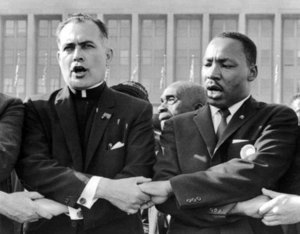Once, at my last parish in Indiana,
our sacristan had to take a couple of months off to recover from surgery, and I
thought I’d figured out everything she did each week and either arranged cover
or just decided to do it myself. But, over those couple of months, I
gradually starting noticing more and more things that just somehow got
magically taken care of when she was around that I’d never really thought about.
During the first week she was gone, one of our parish school kids, a little
second grader, came up to me with a panic struck expression: “There is no
blessing in the church!” I was pretty worried about this exile experience
she seemed to be having, so I tried to figure out what was actually wrong, and
eventually understood that all of the holy water stoups were dry. I could
fix that problem. Spiritual crises aren’t normally the kind of thing you can
fix, so it was nice to get a win for once!
Now, it might seem that the
problem that Mary draws to Jesus’ attention in our gospel is somehow lesser
than our second-grader’s mini-crisis, that it’s more mundane or secular, less
holy, but I think the attention that both Mary and Jesus give to it shows us
that that’s not the case. The second-grader was worried that the church
was out of blessing, which would be very serious if it was true, but Mary is
concerned that the party is out of joy. A wedding feast of the time was
meant to last for days, and it was looking like this one might come to an
abrupt halt.
And Jesus can fix
that. He doesn’t always, he doesn’t always fix problems, so often instead
he chooses to suffer with us, but this time he does. He acts,
definitively to prolong and expand the joy, providing abundant wine. This
is Jesus’ first miracle in John’s gospel, and in many ways the only other
miracle that’s all that similar is the multiplication of the loaves.
Only, then, he acts to deal with physical hunger; this time, he acts to meet
another kind of hunger, the hunger of our hearts for joy. And that’s really
tightly linked with the hunger we don’t always notice we have; the hunger for
faith. Mary trusts Jesus will act before he does, even when his words might
suggest otherwise. The disciples, who have already started following him, make
a huge stride forward in their faith when Jesus expands and prolongs joy. Joy
and faith are not in separate siloes – religious and secular, or what have you.
They’re intimately connected.
Joy is a gift and human joy
is a participation in God’s rejoicing that we heard about in Isaiah. Isaiah
talks about God rejoicing over our return. I think I’ve mentioned here before
that one of my favorite lines of the Mass is when, after the Our Father, the
priest prayers, “Look not upon our sins but upon the faith of the Church.” It’s
an invitation to God: rejoice. We may not be there fully yet, but we’ve started
to come home.
And if joy’s a gift, it
must be a gift given for the good of the whole community, the whole body of
Christ, as St. Paul reminded us in the second reading. That’s what gifts
are for. True joy is a gift which is for others. How often have you
experienced a truly joy-filled person brightening an otherwise dark day?
The reality of joy given now, and the hopeful expectation of the fullness of
joy to come are gifts that can transform the world.
There are many parts of
Martin Luther King’s “I have a dream” speech that people can quote, but I
wonder how many people know the first line? He begins by saying “I am
happy.” “I am happy to join with you today in what will go down in
history as the greatest demonstration for freedom in the history of this
nation.” “I am happy.” Even while standing smarting from
imprisonment and the bad check he was handed marked insufficient funds, he
begins his speech “I am happy.” He will decry with passion the racial
injustices of his day, just as he would those that remain with us today (and I
just saw yesterday what appeared to be a bunch of Catholic High School students taunting a
group of Native Americans after the Indigenous people’s march, so we have much
still to decry), but he will refuse to silence his happiness, in his words, he
will not “wallow in the valley of despair.” And his speech inspired, and
inspires, because he pointed those people whose presence brought him happiness
to a still greater happiness to come, one grounded in Biblical promises (like
the one we heard from Isaiah), the happiness of the dream of little children
holding hands as sister and brother.
That beacon of light is not
at full glare yet. But let us still dare to rejoice. And our God who
rejoices will expand our joy.

No comments:
Post a Comment